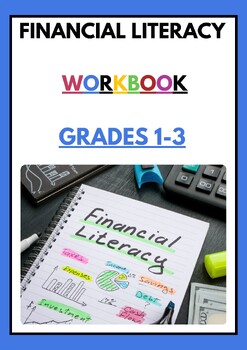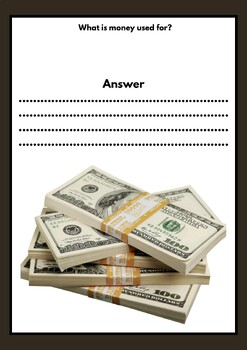Lower Grade (Grade 1-3) Financial Literacy Worksheets and Answer Key
Money Smart Library
1 Follower
Grade Levels
PreK - 3rd, Adult Education, Homeschool, Staff
Subjects
Resource Type
Formats Included
- PDF
Pages
53 pages
Money Smart Library
1 Follower
Description
Lower Grade Financial Literacy Worksheets and Answer Key
Leading Questions. Answers Provided.
- What is money used for?
- How do you earn money?
- What are some examples of things you can buy with money?
- Why is it important to save money?
- What is a piggy bank used for?
- How can you earn money by helping with chores at home?
- What is the difference between needs and wants?
- Why is it important to spend money wisely?
- What is a budget?
- How can you keep track of your money?
- What are some examples of things you can save money for?
- What does it mean to borrow money?
- Why do people borrow money?
- What are some examples of things you might need to borrow money for?
- What is interest?
- How can interest help you save money?
- What is a bank?
- Why do people put their money in a bank?
- What is a savings account?
- How can you open a savings account?
- What is a deposit?
- How can you make a deposit into your savings account?
- What is a withdrawal?
- How can you withdraw money from your savings account?
- What is a credit card?
- How does a credit card work?
- Why is it important to use a credit card responsibly?
- What is a debit card?
- How does a debit card work?
- What is the difference between a credit card and a debit card?
- How do you protect your personal information when using cards?
- What is the importance of having an emergency fund?
- How can you differentiate between needs and wants when making a purchase?
- Why is it important to compare prices before making a purchase?
- What are some strategies for saving money?
- How can you earn extra money besides doing chores?
- Why is it important to set financial goals?
- How can you avoid impulse buying?
- What is the difference between short-term and long-term savings goals?
- Why is it important to give to others or donate some of your money?
- What are some ways you can earn money in the future?
- What is the role of parents or guardians in teaching children about money?
- How can you share resources with others?
- How can you earn money by selling things you no longer need?
- What are some ways you can save money on everyday expenses?
- What are the benefits of comparing prices before making a purchase?
- Why is patience important when saving money for something you want?
- How can you use money to help achieve your dreams and goals?
- What are some examples of fixed expenses?
- How can you avoid overspending on non-essentials?
Total Pages
53 pages
Answer Key
Included
Teaching Duration
Lifelong tool
Report this resource to TPT
Reported resources will be reviewed by our team. Report this resource to let us know if this resource violates TPT’s content guidelines.





